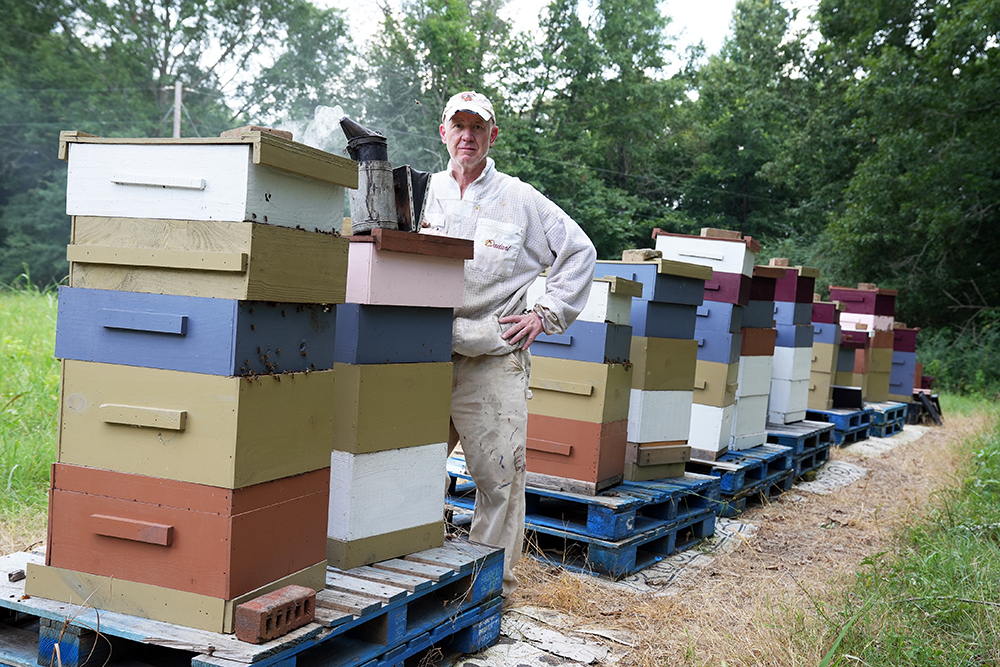Patrick Collins is COO at Morris Marketing Group. That’s where he wears business casual and suits.
He’s also the owner of Ol’ Cappy’s Bee Products. That’s where he wears protective clothing, including a jacket with a hood and canvas pants.
Collins, 49, sells his locally-made honey as well as his products made from beeswax. On the weekends, he cranks up his 1985 Ford 150 and tootles down to Coldwater, Mississippi, with all his beekeeping supplies in the back.
And, yes, he’s been stung “many, many times,” Collins says, adding, “They don’t really want to sting you, but they do it for protection.”
He got into beekeeping about six years ago after he heard stories from a client who keeps bees at his RV park. “I got really interested in it,” he says.
Collins went to a meeting of the Memphis Area Beekeepers Association at Agricenter International. “It’s a half day and they teach you everything you need to know about beekeeping.”
He was amazed to find about 250 people at the meeting. “I thought it would be me and three old guys. Instead, it was an auditorium full of people.”
Collins was one of the winners in the drawing for a beehive, which was given away at the end of the meeting.

They also gave him bees. “You get a box of bees, a small hive. It’s ready to go.”
And those bees lay eggs. “And you end up with 30,000 bees.”
Collins now owns 25 hives, which he keeps on land he owns in Coldwater. “I go down there at least once a week. Usually on weekends.”
He spent hours online “reading about bees and watching videos about how people keep bees and things.”
Collins also learned from “the bees themselves.”
“They’re doing their own thing and you’re going to learn whether you want to or not. You have to learn how to manage them or they’ll all leave.”
Collins was fascinated by the different flavor profiles of local honey. “You can almost really taste the floral notes of it. And the other thing is it changes throughout the seasons. We have a spring, summer, and fall harvest. And the color and the flavor changes with each harvest.”
Spring honey is “really light and really yellow.” Fall is “very robust.” And summer is “really floral, but it is a little more delicate than the fall.”
There is no “winter” honey per se. But bees still make honey in the winter. They remain in the hive “to keep the colony warm during the winter. No matter what the temperature is outside, inside it’s 90 degrees.”
Bees keep that temperature warm by staying in a cluster and vibrating their bodies. They won’t leave the hive until the outside temperature reaches 55 degrees.
A native of Tupelo, Mississippi, Collins wasn’t originally a fan of honey. “I did not like honey growing up. It just wasn’t good to me. It was probably a matter of a real fall honey. Or sometimes when honey is processed, some people use heat in that process and that can change the flavor.”
Collins liked honey for the first time when he tried some local honey about six years ago. Now, he says, “I eat honey three times a day. I mainly eat it as dessert. And I use it with yogurt, peanut butter, and apples. That’s what I eat twice a day for lunch and dinner. In the morning, cottage cheese, berries and honey.”
He doesn’t cook with honey, but he does make “no-bake power balls that use honey.” They’re made with honey, oats, chocolate, and peanut butter. “You can’t get better than that.”
Local honey is made from the pollen from local flora within a 50 mile area, so the honey Collins sells would be considered local honey in Memphis. “Our beehives are on the backside of Arkabutla, which is a protected forest area. So it’s wild. Lots of wild vines and flowers and trees. The bulk of the honey comes from trees. But flowers, too. Trees produce larger plants, which produce large amounts of honey.”
When his beehives grew to about 10 or 15, Collins knew he had to come up with a name for his honey because he needed to start selling it. “That’s when the honey really started flowing in. I knew I wouldn’t be able to eat it or give it all away.”
He produced 55 pounds of honey at his first big harvest four years ago. “This year, I harvested over 2,000 pounds of honey.”
In addition to his regular honey, Collins sells a balm and a salve made out of beeswax. He also sells a creamy, spreadable honey.
Ol’ Cappy’s Bee Products is a family business, Collins says. He and his son Reed bottle honey, and his wife Jill bags and helps with the deliveries.
His honey products are now available at Berryhill Farm and Mrs. Hippie Eats in Hernando, Mississippi. They’re also available on his website olcappy.com. “We deliver it to your house for free,” he says. “We just drop it off at your front door like Amazon.”
Asked who is Ol’ Cappy, Collins says, “That’s me.”
“I love nicknames. And I have given myself nicknames over the years, going back to elementary school and junior high.”
Collins loved the name of the wrestler Porkchop Cash after he became a big wrestling fan as a 6-year-old.“You can pick any kind of meat and put another stupid word with it and that can be your name. Your favorite color. The street you grew up on. So, I adopted ‘Captain Porkchop.’”
The nickname was shortened to “Captain” when Collins was a server at the old Bhan Thai restaurant.
A 16-ounce bottle of his honey sells for $14, but keeping bees and selling honey and honey-based products is a hobby, Collins says. “If you don’t want to pay the price for the products, then I’m happy to eat the product myself. I’m kind of selling you my stash.”
